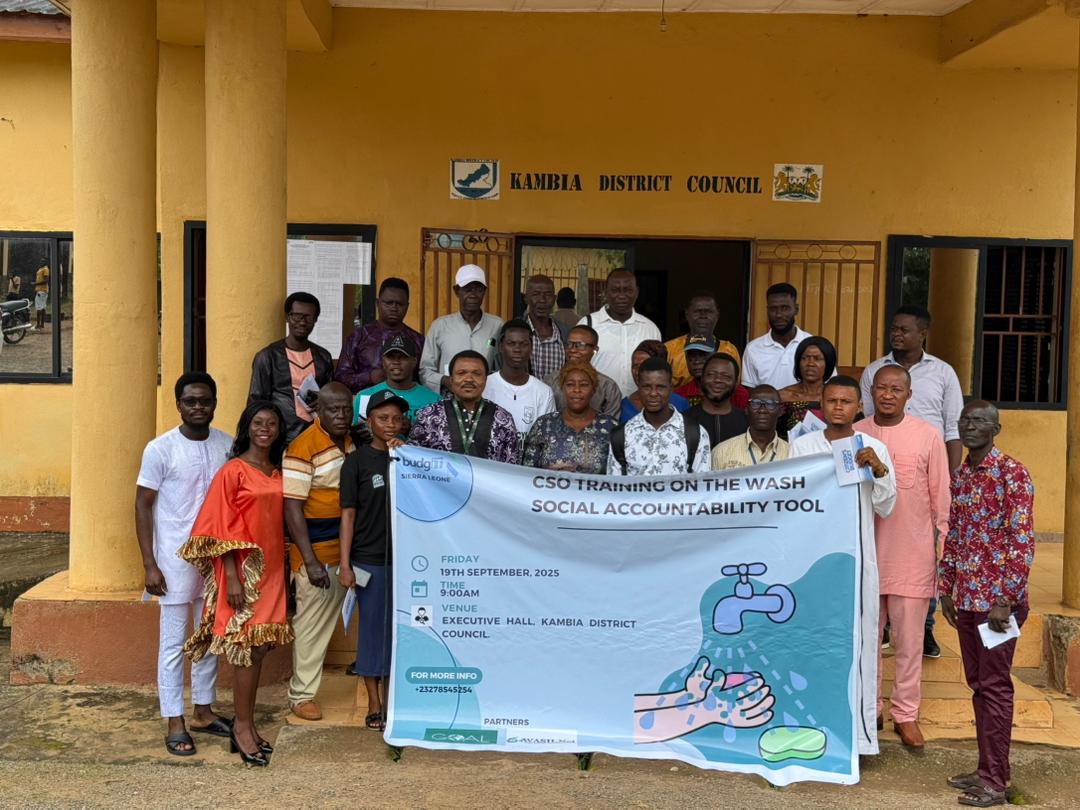On 19 September 2025, BudgIT Sierra Leone and partners brought together 30 Civil Society Organization (CSO) representatives in Kambia District for a one-day training workshop aimed at strengthening local capacity to monitor Water, Sanitation and Hygiene (WASH) in health care facilities. The training also deepened participants’ understanding of the national budgeting process, with a focus on the 2025 budget, supplementary budget, and WASH sector allocations.
This initiative formed part of the Strengthening of WASH Systems for Health Project, implemented in partnership with GOAL Sierra Leone and WASH-Net, with support from the Foreign Commonwealth and Development Office (FCDO). The project is designed to close persistent gaps in budget transparency, service delivery, and citizen oversight by equipping CSOs with evidence- gathering tools to hold duty bearers accountable.
Why This Training Matters
Reliable WASH services are not optional, they are critical for infection prevention, patient dignity, and quality health outcomes in healthcare facilities. Yet, challenges remain in ensuring transparency around WASH financing and accountability for service delivery.
The District Training (Kambia) was therefore convened to:
- Introduce CSOs to BudgIT’s Social Accountability Framework.
- Build participant capacity to use the M-Water Platform for WASH monitoring.
- Provide hands-on experience in budget tracking and evidence collection to drive citizen-led advocacy.
Opening Remarks/ Statements
- Brima Sesay, BudgIT Sierra Leone Country Lead & Lead Facilitator, set the tone with a comprehensive overview of the project, BudgIT’s role in promoting transparency, and key concerns around WASH allocations in the national budget.
- Cecilia Alice Sesay, Communications Officer, highlighted BudgIT’s citizen engagement and communications strategy, emphasizing public education, information sharing, and citizen involvement in shaping Sierra Leone’s development agenda.
- Augustine Martin, Program Officer, presented BudgIT’s Citizen Budget and Supplementary Budget Analysis, drawing attention to gaps in WASH financing before co-leading a demonstration of the M-Water social accountability tool.
- Samuel Kamara, Area Coordinator for Kambia District at GOAL Sierra Leone, warmly welcomed participants to the training and set the stage with a brief overview of the project and its key partners. He highlighted that the initiative is designed to address three critical areas: solid and liquid waste management in Freetown, WASH in health care facilities across five districts, and strengthening governance and leadership in WASH services. Mr. Kamara underscored the timeliness of the training, noting that a WASH-Fit assessment is currently underway to evaluate the district’s WASH situation. The findings, he explained, will serve as the foundation for rolling out the WASH accountability tool, ensuring that interventions are both evidence-based and impactful.
Training Approach
The session was highly interactive and practical, blending presentations, demonstrations, and exercises:
- Presentations & Discussions – National budget processes, WASH financing, and citizen budget tools.
- Tool Walkthrough – step-by-step guide on WASH indicators in healthcare facilities and budget tracking.
- Live Demonstration – Real-time data collection using the M-Water platform, jointly led by Brima Sesay and Augustine Martin.
- Hands-On Group Exercises – Participants practiced data entry, tool navigation, and analysis.
- Plenary Q&A- A space to raise technical and operational concerns, moderated by Brima Sesay.
Key Highlights from Discussions
The live tool demonstration and hands-on practice stood out as major highlights, boosting participant confidence in applying the tool. Feedback and recommendations included:
- The tool can feel time-consuming; participants suggested breaking it into modules for quick assessments.
- CSOs requested official accreditation or passes to improve access to health facilities and strengthen data credibility.
- Calls were made to restructure the tool so that essential questions cannot be skipped, ensuring more complete data.
- Concerns were raised around data confidentiality and the safeguards needed to protect sensitive facility information.
Key Outcomes
By the end of the training:
- Participants had a practical understanding of budget processes and how to use the social accountability tool.
- CSOs in Kambia were equipped to deploy the tool for evidence collection and advocacy.
- Recommendations for tool resizing, skip-logic improvements and institutional accreditation will be integrated before field roll-out.
Conclusion
The CSO Training on the WASH Social Accountability Tool in Kambia was a resounding success. Thirty participants left better prepared to monitor WASH conditions in healthcare facilities, track WASH-related budget allocations, and advocate for more transparent, accountable health financing. The active participation of key partners added strategic weight to the workshop. With concrete commitments to refine the M-Water tool and secure institutional support, CSOs in Kambia are now positioned to generate credible evidence and push for improved WASH services and stronger accountability mechanisms in the health sector.
